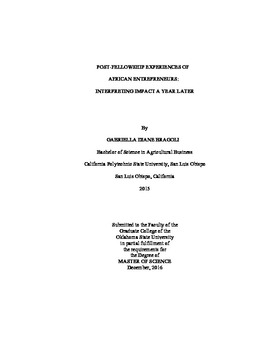| dc.description.abstract | The population of this qualitative study was 11 entrepreneurs who participated in a five-week professional development and cultural exchange program. The Entrepreneur Fellows represented three Sub-Saharan African countries, Kenya, South Africa, and Uganda, and a wide array of enterprises, including agricultural media, agro-inputs and mechanics, production agriculture, retail food sales, social ventures, youth development, and textile design and manufacture. This study assessed the post-fellowship experiences of the participants regarding their enterprise-related goals and motivations, community-level impacts, pervasive challenges, and networking and communication practices. The fellowship program was assessed through the lenses of human capital theory and Ajzen’s theory of planned behavior. Semi-structured interviews were conducted and qualitative content analysis of interview transcripts, electronic mail messages, and other project-related documents provided the study’s findings. The findings revealed three overarching themes and nine subthemes. The Entrepreneur Fellows were deeply committed to life-long learning and the exchange of information. During the fellowship program, participants acquired new skills and knowledge which they intended to use and disseminate. In addition, the Entrepreneur Fellows regarded the expansion of their professional and social networks as very valuable to their business enterprises and social ventures. Furthermore, the relationships formed by participants with other African entrepreneurs, U.S. project participants, and mentors were very important to the Fellows. Participants also regarded selection for the fellowship program as validation of their entrepreneurial abilities and as a measure of success. The findings of this study indicated the Fellows were not only motivated by growth within their enterprises, but also the potential to impact their communities through job creation, reducing youth unemployment, and serving marginalized groups, especially smallholder farmers and youth. In regard to recommendations for future research, it is suggested additional inquiries be conducted to follow-up on the Entrepreneur Fellows and their enterprises, i.e., a multiple-year, longitudinal study. Furthermore, it is recommended additional research be conducted regarding the effectiveness and needs of extension/advisory services, particularly in Sub-Saharan Africa, to support the development of entrepreneurs. It is also recommended similar fellowship programs be supported for and delivered to aspiring entrepreneurs in the future. | |
